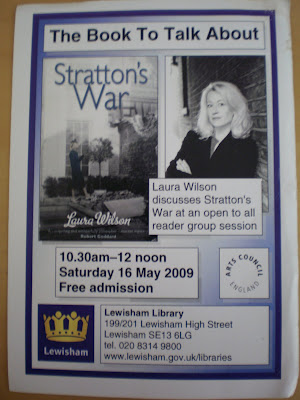
Plodding on
'Statton's War' starts promisingly enough, when a star of the silent film era is found impaled on railings in 1940. Distracted by the opportunists' crime-bonanza of war-torn London, the police conclude it's a suicide. But thirty-something allotment-holder Inspector Stratton - think Dixon of Dock Green's less charismatic younger brother - is not convinced. For one thing, she wasn't wearing her false teeth. Pausing only to tuck a marrow under his arm, he downs his spade and starts to investigate.
Laura Wilson certainly knows her onions as far as WW2 research is concerned. The atmosphere, as claimed on the blurb, is painstakingly evoked by descriptions of bombing raids, transport disruptions, parents anxious about evacuated children and bombed-out buildings. It's for this reason, I expect, that the book won the 2008 Ellis Peters Award for Best Historical Crime Novel.
With Stratton's children evacuated to Norfolk and long working hours, strains on his marriage are apparent, although soon resolved by his low-key reassurances and cuddles in the Anderson shelter. His wife, like his in-laws, lacks sparkle, but that's unsurprising for a woman with no discernible occupation other than knitting balaclavas and keeping Stratton's dinner warm. He's the sort of man who looks forward to lamb stew on Mondays.
His personality is not the only thing that's missing. Surprisingly, for members of a supposedly working class community, Stratton and his wife never mention their parents.
There's a potentially lively side plot with well-born Diana Calthrop, working for M15 and falling for a reputed irresistible double agent, but her passive response to a near-rape 'seduction' stretches the readers' sympathy, not to mention his name - Claude. The upper-class ladies of the 'Right Club' she's assigned to infiltrate, Nazi sympathisers who meet in posh surroundings, and the dark secrets of her work superiors, are overwhelmed by the pedestrian pace set by the lack-lustre hero. Admittedly, he does swear a lot, but not when there are ladies about. He's so worthy, I was quite shocked when towards the end, he threatens to dig up unsavoury details from a suspect's past unless he comes clean about his involvement in the murder.
For me his most unattractive trait is his acceptance of the cover-ups and privileges of his superiors, protected by the rigid class system and 'emergency' powers granted to them by the war situation. I wasn't expecting the maverick tendencies of 'Dirty Harry', or the character flaws of Rebus, but perhaps a bit more chip on his shoulder would make this a less depressing read.
Laura Wilson, who reviews crime for The Guardian newspaper, described researching national archives but said she was even more fascinated to hear from people willing to share their memories of war-time London. The twenty year period following 1940 was notable for social change it brought about, especially transforming the lives of middle class women. (For working women, such as my mother, the change was less dramatic, unless you count being diverted from producing cotton to producing munitions.)
This book is the first of a series in which Inpector Stratton and other characters appear but I think I've had enough of the weak beer and rationing, not to mention straight-up Stratton, despite the author's claim that his vegetable-growing hobby, in these credit-crunch times, gives him fashionable cachet. Who knows, in the next he might take to cycling from Tottenham to Great Marlbrough Street - in bicycle clips.
Stratton's War : http://www.laura-wilson.co.uk/stratton.html
No comments:
Post a Comment